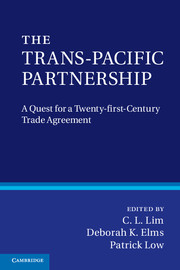Book contents
- Frontmatter
- Contents
- List of Figures and Tables
- Contributors
- Preface
- Acknowledgements
- Disclaimer
- Glossary
- Part I Introduction
- 1 What is “high-quality, twenty-first century” anyway?
- Part II The past: origins of the TPP Agreement
- Part III The present: twenty-first century elements and obstacles
- Part IV The future: high-quality meets regional and global realities
- Part V The TPP negotiations: the quest for quality
- Index
- References
1 - What is “high-quality, twenty-first century” anyway?
Published online by Cambridge University Press: 05 November 2012
- Frontmatter
- Contents
- List of Figures and Tables
- Contributors
- Preface
- Acknowledgements
- Disclaimer
- Glossary
- Part I Introduction
- 1 What is “high-quality, twenty-first century” anyway?
- Part II The past: origins of the TPP Agreement
- Part III The present: twenty-first century elements and obstacles
- Part IV The future: high-quality meets regional and global realities
- Part V The TPP negotiations: the quest for quality
- Index
- References
Summary
Overview
This book is about one of the most significant regional integration initiatives in recent times. The Trans-Pacific Partnership Agreement (TPP) has the potential to become a new model for preferential trade agreements (PTAs). There are two main reasons for this. First, it is an open-ended agreement that clearly contemplates an expanded membership over time. Second, the TPP aspires to set high standards, both in terms of the degree of market openness to be achieved, and the quality and scope of the rules governing trade, investment and regulatory arrangements among its members.
This volume does four things. First, it traces the origins and motivations of the TPP initiative in order to provide the context for assessing the prospective Agreement. Second, it analyses critically the claims of the architects of the Agreement that it will be of “twenty-first century quality” as opposed to the lesser ambition of “twentieth century” PTAs. Third, it analyses options and likely outcomes in specific areas. Fourth, it projects the TPP into the future and considers its place relative to other trade regimes, including beyond the Asia-Pacific, to the World Trade Organization (WTO).
- Type
- Chapter
- Information
- The Trans-Pacific PartnershipA Quest for a Twenty-first Century Trade Agreement, pp. 3 - 18Publisher: Cambridge University PressPrint publication year: 2012
References
- 5
- Cited by



